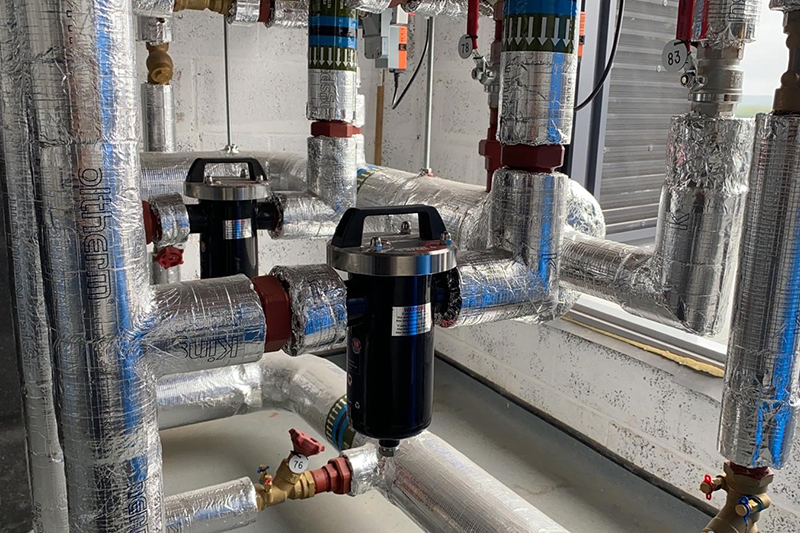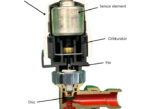
Craig Worth, National Sales Manager at BoilerMag, considers the importance of magnetic filtration in improving the efficiency and longevity of commercial boilers and heating systems.
Whilst heating system treatment programmes are now commonplace in domestic properties, with BSRIA Industry Guidance document BG50/2021 Water Treatment for Closed Heating & Cooling Systems recommending installation of a full flow filter or separator, helping to increase efficiency and reduce maintenance costs, they are arguably more important for larger buildings.
Heating system failures in buildings such as hotels, municipal buildings, office blocks, and factories could be extremely costly in terms of commercial losses through building closure or ongoing energy costs. To ensure the optimum performance of a larger heating system, an effective treatment programme must be implemented.
Larger heating systems require effective treatment programmes to ward off issues that will put a system at risk.
From the moment it is installed a heating system is at risk as water reacts with steel components. This corrosive process causes a build up a black sludge or magnetite, a black mud-like substance that is an accumulation of fine ferrous particles of corrosion.
Left unchecked this can cause problems including blocked heat exchangers and pipes, cold spots in radiators, damage to pumps and valves, and in some cases premature boiler failure. Over time, the system will also suffer from reduced efficiency, greater CO2 emissions, and higher energy and potentially huge capital investment on replacement parts such as boilers.
Reduced bills
The benefits of good system treatment for larger heating systems are significant. Buildings such as hotels, public buildings and hospitals, will not only benefit from business continuity, they’ll also reduce their energy bills and maintenance costs. In addition, there are huge environmental benefits associated with reduced energy use due to increased heating efficiency, including the reduction in carbon emissions and avoidance of boiler scrappage.
The associated costs, such as loss of income due to a broken heating system, could be highly detrimental to a business. Imagine the financial losses and brand damage that could result from having to close a hotel, factory, or other commercial workplaces because of heating system failure. This is why it is vitally important that commercial systems are protected, just as is required for domestic properties.
Good guidance
Whilst only guidance for domestic properties, the latest update of Part L of the Building Regulations provides a good practice blueprint for measures that should be taken to maximise the efficiency and circulation of hot water systems in all types of properties.
It’s highly recommended that specifiers and building managers adopt a sensible approach to cleaning and protecting heating systems to ensure that the health of larger hot water systems is maintained and protected in the long term.
Existing systems should be correctly cleaned and flushed, before using an inhibitor chemical to prevent scale formation and the corrosion of metals. Finally, a filter should be fitted into the heating circuit to maintain the efficiency of the system and prolong its life. Even for new systems, it is good practice to install preventative measures such as filters to ensure that systems remain clean and efficient.
High-performance magnetic filters are the most effective way of preventing of the build-up of magnetite or black sludge in larger heating systems, reducing energy bills, reducing maintenance costs and increasing boiler life.
BoilerMag provides a range of highly effective commercial filters ideal for many small and large commercial and industrial properties. Both offering its patented dual-flow technology, the BoilerMag XL and BoilerMag XT provide impressive results, removing the majority of unwanted debris from the system.
The BoilerMag XL is compatible with 1 ½” pipes and has an operating pressure of up to 12 bar, making it suited for medium-sized commercial or retail properties. With powerful magnets and a high collection capacity, they extract ultrafine particles and can be cleaned easily during the normal system routine service. The BoilerMag XT is available in sizes to fit 2” up to 12” pipes with PN16 flanges and can be installed in a variety of larger buildings, including factories, offices, hospitals and schools.
The combination of good quality water treatment chemicals with careful testing, the use of an inhibitor to reduce limescale, and the installation of a magnetic boiler filter is essential for the maintenance and efficiency of commercial heating systems.
Cleaning chemicals
Cleaning chemicals are the perfect addition to commercial heating maintenance processes, helping with the effective removal of limescale deposits, installation debris, and magnetite.
It is known that around 60% of UK homes are in hard water areas with a typical four bedroom house accumulating 70kg of limescale in a year. Limescale deposits tend to stick to heating elements, heat exchangers, pipes and radiators and can significantly reduce heating efficiency, as well as reducing the life of the boiler. It can also cause a ‘kettling’ effect which gives rise to excess noise.
Good quality, high-performance cleaning chemicals will display the Benchmark logo, which is a valuable endorsement of the product reputation and associated backup services. In addition to excellent limescale and iron oxide dispersal rates, cleaning chemicals should be phosphate-free to avoid damage to pumps and bearings.
Whilst filters and treatment chemicals are becoming commonplace in domestic installations, direct limescale treatment methods are often overlooked. The BoilerMag Electrolytic Scale Reducer offers simple, cost-effective, long-lasting protection. The combination of a copper body, and an internal zinc anode, releases zinc ions into the water.
This reacts with limescale particles and changes their state, making them less likely to stick to key heating components – thereby reducing the risk of blockages and limited heat exchange performance.
The Boilermag ESR is WRAS approved and has a 10-year service life.













